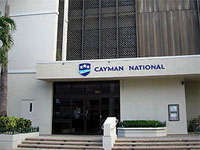 A leaked document has revealed that Britain plans to impose its own version of the US Foreign Account Tax Compliance Act (FATCA) on its overseas territories, such as the Cayman Islands, as well as the crown dependencies of Jersey, Guernsey and the Isle of Man.
A leaked document has revealed that Britain plans to impose its own version of the US Foreign Account Tax Compliance Act (FATCA) on its overseas territories, such as the Cayman Islands, as well as the crown dependencies of Jersey, Guernsey and the Isle of Man.
FATCA, which will come into force next year, requires foreign banks to report American account holders to the US Internal Revenue Service. The draft UK equivalent, seen by the magazine International Tax Review, will require British tax havens to make similar disclosures about UK account holders to UK tax authorities, London’s Observer newspaper reported.
The move, which is expected to be unveiled in the chancellor’s autumn statement and come into force in 2014, will have major consequences for those trying to hide their money offshore.
“It’s a complete bombshell for these places,” Richard Murphy, a tax expert who has seen the draft plan, told the Observer. “Some people will try to flee, but this is going to change the whole of the offshore market.”
He explained that the draft plan amounted to the UK using US legislation to give tax havens an ultimatum: “It’s either they give the UK the same data that they want to give the US or the UK won’t pass their laws to let data flow to the US.”
The ultimatum is crucial, Murphy suggested. If the UK refuses to pass the laws, its tax havens “might just as well shut up shop since there would be almost no banks or other institutions willing to locate there”.
Joseph Stead, Christian Aid’s senior adviser on economic justice, said that if the draft was implemented it “would be the beginning of the end for tax haven secrecy”.
According to the Observer, the Treasury declined to comment but confirmed to the Review that it was assisting the UK’s crown dependencies and overseas territories to produce their response to FATCA.
In a response to the Observer article, Anthony Travers, chairman of the Cayman Islands Stock Exchange and former senior partner and managing partner of Cayman-based law firm Maples and Calder, said that Christian Aid and Tax Justice Network continue “a long and risible history of disinformation” which appears, once again, to have confused the article’s author.
“A moment’s research reveals the correct position to be nothing of the sort. The Cayman Islands has had full proactive tax reporting with all EU Treasury departments since 2005 and has full disclosure tax information agreements with HMRC and the IRS and many others. The publically available statistics reveal bank deposits in Cayman from EU residents to be statistically irrelevant,” he said.
“Misguided focus on tax transparent offshore jurisdictions simply perpetuates the UK’s tax collection problem by deflecting proper consideration from the real issues,” Travers added.
By Caribbean News Now!



